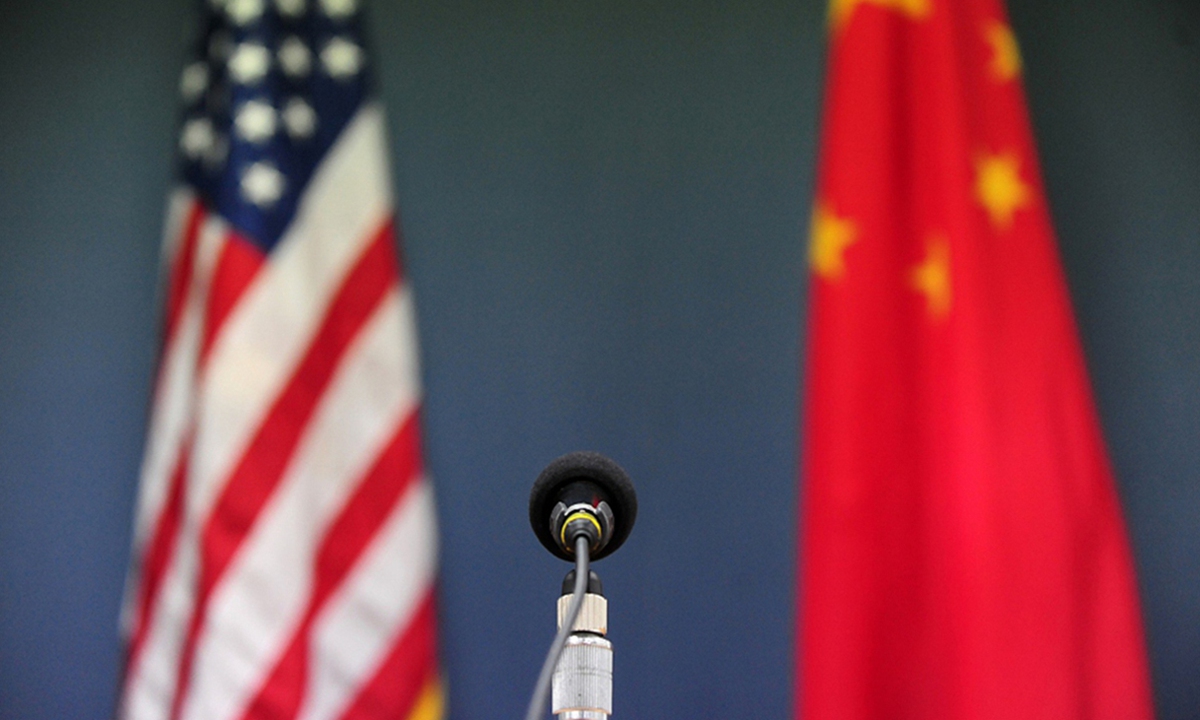China again stresses 'road to San Francisco cannot rely on autopilot,' avoiding confirming San Francisco summit
Washington urged to implement Bali consensus

China US Photo: VCG
A Chinese Foreign Ministry spokesperson on Wednesday did not directly confirm an announcement made by US officials that "China and the US have an agreement in principle to hold a summit in San Francisco." Instead, the spokesperson, citing quotes from Member of the Political Bureau of the Communist Party of China Central Committee and Foreign Minister Wang Yi during his recent visit to the US, stressed "the path to San Francisco" cannot rely on "autopilot," urging the US to earnestly "return to Bali [the 2022 summit]" and truly implement the consensus of the two heads of state.
The key to realizing a summit in San Francisco lies in whether the US can abandon framing US-China relations as intense competition and return to a positive path oriented by cooperation, Chinese experts believe.
They pointed out that currently the differing perceptions of their bilateral relationship between China and the US pose a fundamental obstacle to achieving a summit - China seeks a substantial improvement in bilateral ties, whereas the US merely offers superficial gestures of goodwill.
Experts said they would wait and see how Washington will respond toward China's hope and requirements before the Asia-Pacific Economic Cooperation Leader's Meeting, or APEC, in San Francisco in mid-November.
White House press secretary Karine Jean-Pierre announced Tuesday leaders of the two countries have "an agreement in principle to meet in San Francisco in November," but important details need to be hammered out.
However, Chinese Foreign Ministry spokesperson Wang Wenbin did not directly confirm this summit. He stated that China and US have agreed to work together toward the San Francisco summit. He stressed that "the path to San Francisco" cannot rely on "autopilot," and noted that the two sides should earnestly "return to Bali [the 2022 summit]," truly implement the consensus of the two heads of state, remove interference, overcome obstacles, enhance consensus and accumulate results.
The spokesperson also announced that Chief Executive John Lee of Hong Kong Special Administrative Region, who is on the US sanction list, has received an invitation from the US to attend the APEC meeting, but due to scheduling issues, Lee will not attend in person, and will instead dispatch Paul Chan, the city's finance chief, in his stead.
The White House rushed to release information on a possible summit, which is apparently intended to convey both domestically and internationally that the US will undoubtedly succeed in this foreign diplomacy on its home turf, Li Haidong, a professor at the China Foreign Affairs University, told the Global Times on Wednesday.
Biden is more eager and proactive to convene the meeting with the Chinese leader as the US president hopes to make this bilateral summit his diplomatic highlight that he can boast about amid his overall struggling foreign policy, so he can promote confidence in American leadership among the domestic population and international community, Li remarked.
However, whether Biden can shape the potential China-US summit into a lasting resource for stable bilateral relations is an area that we need to observe with caution, Li stressed.
Although the Biden administration is trying to achieve the summit, CBS News noted that "Publicly, the president frames the United States' relations with China as one of strategic competition, even as the US looks to counter China's influence in the Indo-Pacific and Africa."
Lü Xiang, a research fellow at the Chinese Academy of Social Sciences, questioned Washington's definition of its ties with China, saying that if the Biden administration sticks to its position that competition is at the core of bilateral ties, a summit with China is pointless.
What China is seeking is a bilateral relationship defined by cooperation, where competitive issues are addressed within the framework of cooperation, rather than a relationship defined by competition, Lü told the Global Times on Wednesday.
"Therefore, there is still a difference in the overall direction between China and the US. We hope that the US can also recognize that this divergence, which is not just a matter of expression, represents a fundamental difference in the current views of the two countries on their relationship," he said.
Recently, Washington has toned down its China-lashing narratives, which is encouraging, but Chinese experts pointed out that the US has not made any substantial promises in its exchanges with China, even during Wang Yi's US visit.
Washington should take concrete actions in practical areas, Lü urged.
For example, according to some Chinese experts, the Biden administration can scrap tariffs put in place by former US president Donald Trump, as they not only have failed to achieve their objectives, but also have hurt US businesses and consumers along the way. Also, it can remove some sanctions and crackdown measures against Chinese entities and personnel to show its sincerity toward bilateral ties.
Considering the mounting voices in the US calling to end measures that form part of the US-initiated trade war against China, trade issues and some of the US' restrictions on tech exports could be the first to be addressed to facilitate a China-US summit, Lü believes.

